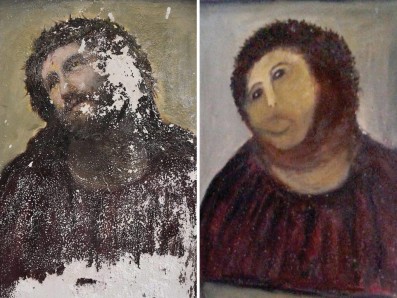
Behold the… monkey? The botched Jesus painting is now one of Spain’s most famous pieces of artwork.
At the time there was plenty of guffawing and not a little shock and outrage: how could an amateur pensioner have been let loose on the restoration job of one of the most beloved, valuable and historic pieces of art at Borja’s Sanctuary of Our Lady of Mercy church?
In 2012 that is exactly what happened. Part-time curator Cecilia Giménez was tasked with the touching-up job of the 120-year-old Ecco Homo (Behold the Man) fresco of Jesus Christ… and managed to mess it up spectacularly…
The now infamous ‘Beast Jesus’ painting – with lines more blurred than a Charlie Sheen script rehearsal – quickly became an internet sensation in its own right, generating millions of memes and shares across the web.
Indeed, Borja decided to turn the world’s media spotlight into something good and profitable, charging visitors €1 each to view the now obscure-looking painting and, sure enough, crowds soon flocked to mock and pose.
In fact, such has been the unintended success of the painting’s appeal that Borja is now building a visitor centre dedicated specifically to the artwork.
But now the story has taken an even odder turn, with octogenarian Giménez about to find further fame as the protagonist in a new opera set to open soon in the USA.
Composer Paul Fowler and librettist Andrew Flack, based in Colorado, USA, have penned a musical about the saga titled Behold the Man. Flack has even spent a great deal of time in Spain getting to know Giménez – finding out what makes her tick, exploring her interest in art, and generally asking her how she is coping with the fame that has been thrust upon her.
The musical-cum-opera is thought to be a tragicomedy that will explore the story of how an innocent, well-meaning church attendee transformed a respected and revered 120-year-old piece of art into something that looks like a cross-dressing monkey.
The opera will look into how such an obvious and innocent mistake has managed to capture the imagination of the public, and will touch on themes of social media, viral content, art history and general humour.
According to Flack, it was Giménez’s innocent and horrified response to the attention her work was getting that compelled him to write a play.
“I can tell she’s stricken, horrified by what’s happened, and I feel so badly for her – that her well-intended mission has gone so wrong,” Flack told The Local. “We approach the story with reverence, but also humor,” he added.
“The family is honoured we’ve found inspiration in the story and Giménez gives her full blessing to the project.”
 en
en



 Vlaams-Nederlands
Vlaams-Nederlands
0 Comments
Leave a Comment
DISCLAIMER
The opinions and comments expressed by contributors to this Blog are theirs alone and do not necessarily reflect the views of VIVA Homes Under the Sun Ltd, any of its associated companies, or employees; nor is VIVA to be held responsible or accountable for the accuracy of any of the information supplied.
Have you got something to say?